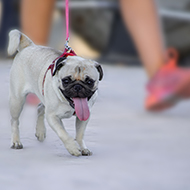
Warnings have been issued by dog welfare organisations following new VetCompass Programme research.
Dogs Trust, along with a coalition of dog welfare organisations, is urging dog owners to take extra caution when walking or exercising their pets in the heat, after research reveals that this is the most common trigger for heat-related illness.
The research from the VetCompass Programme shows that of the common trigger situations for heat-related illness in dogs (hot weather, humidity, vehicle travel in heat etc...), exercise in hot weather accounts for 74 per cent of heat-related illness cases seen by UK vets. Additionally, more than one in 10 cases are triggered by hot weather, and five per cent are a result of dogs being confined in a vehicle.
Brachycephalic dogs were also shown to be significantly more at risk, with over a third of brachycephalic dog owners reporting that heat regulation is a problem for their dog, with English bulldogs being 14 times more likely to suffer from heat related illness, whilst French bulldogs are six times more likely, and pugs three times more likely.
Chair of the Brachycephalic Working Group, Dr Dan O'Neill, said: “Owners have been alerted for years about the dangers of leaving dogs in cars especially in hot weather, but the latest VetCompass research at the RVC shows that it’s not just bright sunshine and being confined in a vehicle that can cause heat-related illness. Factors such as over exertion and humidity also play very significant roles; it doesn’t take a great amount of exercise to have potentially dangerous effects when the weather is hot or humid.
“In hotter weather, we urge owners to consider exercising their dogs in the early morning or late evenings when temperatures are cooler and to be especially careful with breeds that are flat-faced in order to avoid potentially devastating heat-related illness in their dogs.”
Paula Boyden, Dogs Trust director, added: “Dogs Trust has campaigned for many years on the ‘Hot Dogs’ issue, providing guidance to owners to help them look after their dogs in hot weather, but sadly every year we hear of dogs dying as a result of heatstroke. The findings of this research are so important in highlighting the impact of exercising dogs in hot weather.
“The research also showed the risks to dogs are much lower if heatstroke is detected and managed early. Therefore, raising awareness and knowledge of the early warning signs amongst owners, and encouraging prompt attention, will help avoid the heart-breaking situation of their dog becoming severely ill or dying as a result.”



 The BSAVA has opened submissions for the BSAVA Clinical Research Abstracts 2026.
The BSAVA has opened submissions for the BSAVA Clinical Research Abstracts 2026.